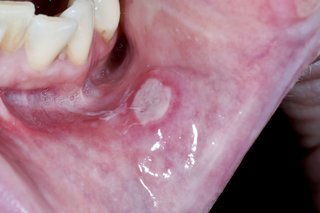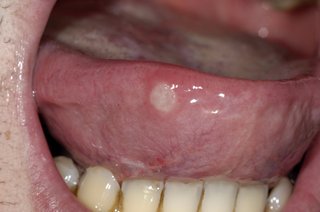When should I see a doctor about a mouth ulcer?
Most people do not need treatment initially. Mouth ulcers are very common and usually clear up on their own within two weeks. They are rarely a sign of anything serious but can be uncomfortable. Here are some basics first.
What is a mouth ulcer?
Mouth ulcers are usually white round or oval sores that appear inside the mouth on the:
- Cheeks
- Lips
- Tongue.
You may have more than one ulcer at a time, and they can change in size.
Mouth ulcers aren’t contagious – i.e. they do not spread to other people – and shouldn’t be confused with cold sores. Cold sores appear on the lips or around the mouth and often begin with a tingling, itching or burning sensation.
Hence mouth ulcers cannot be caught by kissing, or by sharing drinks and utensils.
 Typical mouth ulcer on inside of lip
Typical mouth ulcer on inside of lip
 They can appear on tongue as well
They can appear on tongue as well
Tell me more about mouth ulcers , their causes, treatment and when to see a doctor.
What are the causes of mouth ulcers?
For the common type of mouth ulcers, the cause is not kn0wn.
But mouth ulcers can be a sign (sometimes the first sign) of more serious condition that requires medical treatment, such as:
- Coeliac disease
- Inflammatory bowel disease (IBD), including ulcerative colitis
- Diabetes
- Vitamin B12 or iron deficiency
- Stevens-Johnson Syndrome / toxic epidermal necrolysis (TEN)
- Autoimmune diseases, including:
- Lupus
- Behçet’s disease, a rare condition that causes inflammation throughout the blood vessels
- Infections
- HIV
- Other viral infections – including the cold sore virus, chickenpox, and hand, foot and mouth disease (which also causes a rash on the hands and feet)
- Cancer and pre-cancer conditions
- Oral lichen planus, which causes a white, lacy pattern inside the cheeks
- Mouth cancer, i.e. cancer of the mouth can first appear as a mouth ulcer.
This is a long list of causes of mouth ulcers from New Zealand. Usually there is no serious underlying cause.
What is the treatment for normal mouth ulcers?
Mouth ulcers need time to heal and there is no quick fix. Here are some do’s and don’ts.
Do’s
- Use a soft-bristled toothbrush
- Drink cool drinks through a straw
- Eat softer foods
- Get regular dental check-ups
- Eat a healthy, balanced diet.
Don’ts
- Eat very spicy, salty or acidic food
- Eat rough, crunchy food, such as toast or crisps
- Drink very hot or acidic drinks, such as fruit juice
- Use chewing gum.
How should I treat them?
If they are not too bad, you do not need any treatment. They will get better anyway.
But if they are a real problem, speak to your pharmacist; who can recommend a treatment to speed up healing, prevent infection or reduce pain, for example:
- Antimicrobial mouthwash
- Painkilling mouthwash, gel or spray
- Corticosteroid lozenges.
You can buy these without a prescription.
When should I see a doctor (or dentist) about a mouth ulcer?
See a dentist or GP if your mouth ulcer:
- Lasts longer than 3 weeks
- Keeps coming back, and appear before the old ones heal
- Is unusually large
- Is a painless sore
- Becomes more painful and red – this may be a sign of an infection,
Your GP or dentist may prescribe stronger medication to treat severe, recurrent or infected mouth ulcers and/or look for rarer causes.
Although most mouth ulcers are harmless, it is best to get a long-lasting mouth ulcers checked.
Summary
We have described when should I see a doctor about a mouth ulcer? We hope you understand it better now.

